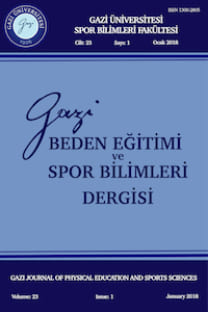BEDEN EĞİTİMİ VE SPOR ÖĞRENİMİ GÖREN ÜNİVERSİTE ÖĞRENCİLERİNİN SIVI TÜKETİMLERİ VE DİĞER BÖLÜMLERDE OKUYAN ÖĞRENCİLERLE KARŞILAŞTIRILMASI
Fiziksel aktivitenin yoğun olduğu üniversitelerin beden eğitimi ve spor bölümleri ile fiziksel aktivitenin olmadığı diğer muhtelif bölümlerde okuyan öğrencilerinin sıvı tüketim miktarlarında bir farklılık bulunup bulunmadığının incelenmesi ve karşılaştırılması amaçlanmıştır. Araştırma için, Türkiye’nin değişik üniversitelerinin ( Fırat Üniv., Çukurova Üniv., 18 Mart Üniv., 19 Mayıs Üniv. ve Kafkas Üniv.) beden eğitimi ve spor bölümleri ile diğer muhtelif bölümlerde okuyan öğrenciler seçilmiştir. 340 beden eğitimi ve spor bölümü öğrencisi (21.02±1.96) ile diğer bölümlerde okuyan 338 öğrenciden (20.80±2.17) oluşan toplam 678 kişilik öğrenci grubuna toplam beş günlük sıvı tüketimlerini belirleyen bir anket formu uygulanmıştır. İstatistiksel anlamlılık düzeyi 0,05 ve 0.01 olarak seçilmiştir. Tüketilen sıvılar bakımından, beden eğitimi bölümleri ile diğer bölümler arasında istatistiksel açıdan anlamlı bir farklılık olduğu tespit edildi. (P<0.001). Hem beden eğitimi ve spor bölümlerinde ve hem de diğer bölümlerde günlük en fazla tüketilen sıvının su (% 45.93 oranında 4.58±1.15 bardak veya 916±17.7 cc) olduğu belirlendi. Ayrıca genel olarak bakıldığı zaman, hafta içinde ve hafta sonunda beden eğitimi ve spor bölümlerinde okuyan öğrencilerin tükettikleri toplam sıvının (10.75±0.36 bardak veya 2151±71.9 cc), diğer farklı bölümlerdeki öğrencilere (9.23±0.32 bardak veya 1851±63.3 cc) oranla daha fazla olduğu tespit edildi. Araştırmanın Mart-Nisan (1999) aylarını içine alan mevsim olarak baharda yapılmış olması da hava şartlarına bağlı olarak günlük su tüketim oranlarını etkileyen bir başka faktördür. Bu araştırma sonucu, beden eğitimi ve spor bölümleri ile diğer bölümlerde okuyan öğrencilerin bilinçli olarak sıvı tüketmediklerini göstermektedir.
Anahtar Kelimeler:
Beden eğitimi, Öğrenci, Sıvı tüketimi
THE FLUID CONSUMPTIONS OF THE STUDENTS OF PHYSICAL EDUCATION AND SPORT DEPARTMENT AND THE COMPARING WITH THE REST OF OTHER DEPARTMENT STUDENTS
The aim of this research is to find out the differences between the fluid consumption of the students, of the department physical education and sport, who suffer too much physical activity in comparing with the rest of other department students. For this purposes; students from different Turkey universities (F›rat University, Çukurova University, 18 Mart university, 19 May›s university and Kafkas University) were selected as subject. Among them 340 was attending to the physical education and sports department (21.02±1.96) and 338 was attending to the other department (20.802.17). Total of 678 questionnaire were given to the students which consisted 8 different question. Moreover another inquirey which asking the total liquid consumption on five days (three days in week and two days during the weekends) was also applied, the data which represents the liquid consumption were analyzed with variance analysis and SSPS 9.01 statistics program. Statistical value were selected also 0.05 and 0.01. In point of fluid consumption a statistical differences was found between the students of physical educations and sport department and the rest of others (P<0.001). Either at the department of physical education and sport or other department, the prevalent fluid was found as watcher with (45.93 % 4.581.15 glass and/or 9.1617.7 cc). Or the other hand, from the point of general view, the total fluid that consumpted by the students of physical education and sport department either in week or at the weekends (10.750.36 glass and/or 215171.9 cc) were much more than the rest of other students (9.230.328 glass and/or 185163.3 cc). Since the research was performed during March-April (1999) period the water consumption might be effected from weather conditions. This data indicated that the students who attending either to physical education and sport and the other departments were not informed in case of fluid consumption.
Keywords:
Physical education, Students, Fluid consumptions,
___
- 1-Bilge, N., (1988) “Türkiye’de Beden Eğitimi Öğretmeninin Yetiştirilmesi (Dün-Bugün), Ankara Üniversitesi Sosyal Bilimler Enstitüsü Doktora Tezi, Ankara
- 2- Dereli, T., (1981) Organizasyonda Davranış, İstanbul
- 3- Ekenci, G., (1996), Gençlik ve Spor İl Müdürlerinin Görev Alanlarını Önem ve Zaman Bakımından Değerlendirmeleri, Gazi Üniversitesi, Beden Eğitimi ve Spor Bilimleri Dergisi, Sayı:2 Ankara
- 4- Gençlik ve Spor Genel Müdürlüğü, (1995), Sporda 10 Yıl, Gökçe Ofset, Yayın No:18, Ankara
- 5- Hoffmann, U., (2000), Almanya da Yüksek Spor Okulunda Spor Bilimlerinin Gelişimi, 21 Yüzyılda Spor Eğitimi, Akdeniz Üniversitesi Beden Eğitimi ve Spor Yüksekokulunun 18 Şubat 2000 tarihinde düzenlemiş olduğu konferansta sunulan bildiri, Antalya
- ISSN: 1300-2805
- Yayın Aralığı: Yılda 4 Sayı
- Başlangıç: 1996
- Yayıncı: Gazi Üniversitesi
Sayıdaki Diğer Makaleler
İLKÖĞRETİM OKULLARINDA SPOR YAPAN VE YAPMAYAN ÇOCUKLARIN BENLİK KAVRAMI DÜZEYLERİ
Asuman Seda Saracaloğlu, Saadet Rana Varol, Nalan Aras
Settar Koçak, Ünal Karlı, Deniz Kutlu
Hakan Sunay, Mehmet Murat Boz, Pembe Gürbüz
